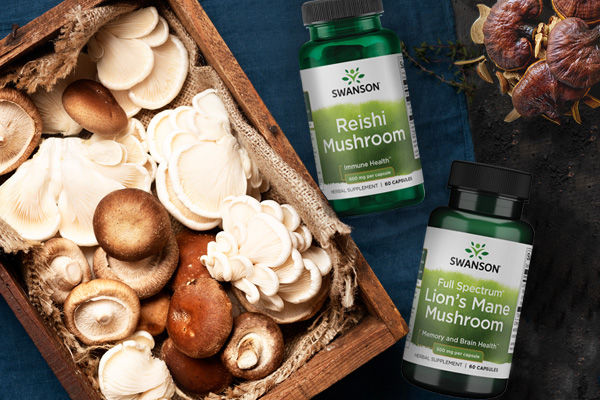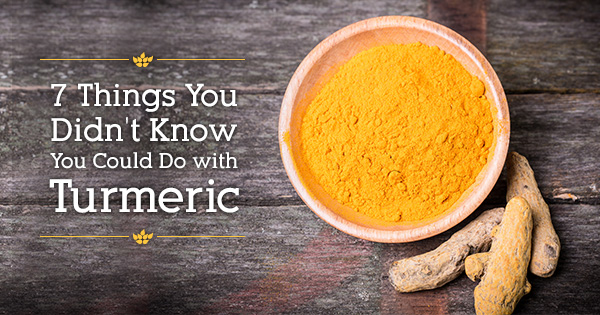What is Turmeric and What are the Benefits of Turmeric
Turmeric is a plant in the same botanical family as ginger. It’s native to southern Asia, but turmeric is grown in a few other warm, humid climates around the globe. Like ginger, it’s the tuberous shoots (rhizomes) of the plant that are used in foods and health supplements. The powdered turmeric you find in the spice aisle is made by boiling, drying and finely grinding the roots of the turmeric plant.

Most people think of turmeric as the “curry spice” and mistakenly think turmeric is spicy. Turmeric gives curry its signature, yellow color and distinct flavor, but it isn’t actually spicy. Turmeric is also added to mustards, pickles and relish, and it’s sometimes used as a substitute for saffron.
But aside from lending color and flavor to some of our favorite foods, the potential health benefits of turmeric are truly impressive. Research and historical usage shows turmeric may provide relief and support to our bodies in many ways.1
History of Turmeric Use
Turmeric has been used in medicines and as a culinary spice for nearly 4,000 years, dating as far back as the Vedic culture in India, where it also held religious significance.2 An Ayurvedic text dating back to 250 B.C. mentioned its use for relief from digestive disturbances related to spoiled food; plus, other cultures use turmeric for digestive health and liver support, even including it in lotions and creams as a skin tonic.2
Over the last 25 years, modern medicine has increasingly acknowledged the importance of turmeric as well, particularly the benefits of curcumin, a well-known and frequently studied phytonutrient in turmeric. Curcumin, which is found in turmeric, is a powerful antioxidant and can help support heart, cardiovascular and joint health.3

What is Turmeric Good for?
Turmeric for Memory, Mood and Attention
Exciting research out of the University of California (UCLA) revealed that curcumin supplements may have a positive impact on cognitive health – supporting memory, attention and mood in healthy, middle-aged or older adults.4 The study was a double-blind, placebo-controlled trial over a period of 18 months, focusing on 40 adults that had complained of having memory-lapses prior to the study.
At the conclusion of the study, adults who took curcumin supplements (90 mg twice a day) showed a 28% improvement on memory tests, as well as improvements in mood and sustained attention.4 The type of curcumin used in the study was a highly-absorbable form of curcumin derived from Turmeric known as Theracurmin®, which is 27 times more bioavailable than standard curcumin.
Swanson Ultra High Absorption Theracurmin® is standardized to 27%. You would need to take 3 capsules twice each day, for a total of 6 capsules per day, to reach the intake that resulted in the positive outcome of this study.
We will continue to provide updates on the potential benefits of curcumin for cognitive health as new studies emerge.
Turmeric and Digestive Health
If you suffer from digestive or gastrointestinal issues, this healthy spice just might be the answer. Turmeric provides multifaceted digestive comfort and supports the lower gastrointestinal system.
Turmeric for Bowel Disturbances - Turmeric can help relieve gastrointestinal discomfort from eating spicy or fattening foods. It can also help with gas, support digestion and calm abnormal muscle movements resulting from digestive issues. The potassium and magnesium in turmeric can help your body regain balance after a bout of diarrhea.
Turmeric as a Digestive Aid - The vitamins, minerals, antioxidants, and phytochemicals in turmeric have a soothing effect on the gastrointestinal system and provide support for digestion. Turmeric can even help combat some queasiness and support internal cleansing. Herbalists have used turmeric for centuries as a liver tonic. Because of its digestive benefits, some people also use turmeric for weight loss.
Ways to Take Turmeric
Since it’s typically eaten with other ingredients in food, you might wonder— what does turmeric taste like alone? By itself, turmeric doesn’t taste that great. It has a pungent and bitter flavor, so if you eat it, it’s best combined with other flavors. But you wouldn’t eat most other spices alone either. Just imagine eating a mouthful of cinnamon powder vs. adding a sprinkle of cinnamon to your coffee!
Thankfully, there are plenty of ways to get turmeric benefits without adding it to everything you eat. Turmeric is available in supplements, extracts, teas and even as a coffee creamer!
Turmeric Supplements
There are a variety of turmeric supplement options available to suit your individual needs. Since the curcuminoids in turmeric are more efficiently absorbed when consumed with black pepper, we developed Swanson Health’s Premium Full Spectrum Turmeric & Black Pepper supplements. If you have a sensitive digestive system, you might also try Kyoto Fermented Turmeric.
Turmeric Teas
Supplement your daily turmeric intake with turmeric herbal teas, which are available either with turmeric as the only ingredient or in flavorful combinations with additions like ginger and lemon balm. You can even use Swanson Organic Turmeric Tea to cook rice! Just add a couple of tea bags to your rice water.
Turmeric for Skin
Turmeric is good for your skin when taken as a supplement because of its antioxidant effects, but it’s also used in facial creams to improve skin quality, including Swanson’s Brightening Turmeric + C Enlighten Serum to help calm and brighten skin.
Turmeric Cocktail
We love using turmeric and ginger in celebratory beverages. An easy way to add turmeric to your beverages is to infuse one of the ingredients with turmeric. If you're a fan of the Moscow Mule, try this easy Turmeric Mule recipe. You'll need to create your own turmeric-infused vodka first.
How to Make Turmeric-Infused Vodka
You'll need:
- 1 16 oz mason jar
- 10 oz vodka
- 1 2-inch long fresh, peeled turmeric root
Instructions: After peeling the turmeric root, mash it slightly with the back of a spoon. Add the turmeric root to the mason jar and then pour in the vodka. Seal tightly and leave 24 hours or longer, according to your taste preference. Once the turmeric flavor is at a strength you like, strain and transfer the turmeric-infused vodka to an air tight container for storing.
How to Make a Turmeric Moscow Mule
You'll need:
- 1 high ball glass or Moscow Mule mug
- 2 oz turmeric-infused vodka
- 1/2 oz fresh lime juice
- 1/2 oz simple syrup (optional)
- 3 oz ginger beer
- ice
- garnish, lime wheel or lime rind
Instructions: In a cocktail shaker, combine ice, vodka, fresh lime juice and simple syrup. Shake until blended and well-chilled. Pour mixture into a highball glass or Moscow Mule mug with fresh ice. Top with ginger beer and stir before adding lime garnish.
For non-alcoholic ways to use turmeric, including how to make a turmeric latte or turmeric salad dressings, see How to Make Turmeric Paste. Learn more about turmeric in Turmeric vs Curcumin: What is the Difference?
Do you have your own tips for using turmeric, or turmeric success stories? Share them in the comments below.
If you enjoyed reading this article about the health benefits of turmeric, sign up for Swanson Health emails to get more healthy tips, and special deals and promotions on Swanson Health Products.

About Lindsey Toth, MS, RD
Lindsey is a nationally recognized registered dietitian and nutritionist with a soft spot for ice cream. She empowers people to take charge of their health by finding the balance between the pleasure and nourishment in food. Her philosophy is that you should take care of your body because it’s the only permanent home you have. It’s what inspired her to pursue a career in nutrition.
*These statements have not been evaluated by the Food and Drug Administration. These products are not intended to diagnose, treat, cure, or prevent any disease.
Sources
1. Turmeric Benefits. Johns Hopkins Medicine. Read source
2. Turmeric, the Golden Spice. National Institute of Health. Read source
3. 11 Superfoods That Work Better Together: Time Health. Read source
4. Effects of a Bioavailable Form of Curcumin. The American Journal of Geriatric Psychiatry. Read source
GOVERNMENT WARNING: (1) According to the Surgeon General, women should not drink alcoholic beverages during pregnancy because of the risk of birth defects. (2) Consumption of alcoholic beverages impairs your ability to drive a car or operate machinery, and may cause health problems.



